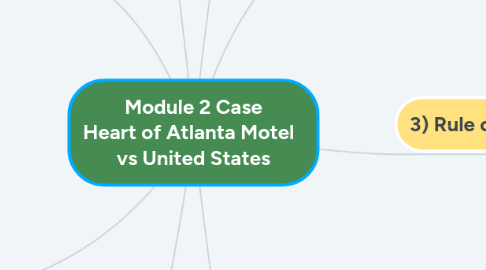
1. 5) Conclusion
1.1. The United States District Court of Northern Georgia ruled in favor of the United States and issued an injunction requiring the Atlanta Motel to refrain from using racial discrimination when renting the motel to guests
2. 6) Impact
2.1. Case of Georgia Governor Lester Maddox concerning his restaurants refusal to serve African Americans
2.2. Katzenbach vs McClung. United States Supreme Court ruled Commerce Clause forbid racial discrimination in restaurants since it was a burden to interstate commerce
3. 8) Influence
3.1. Hiring practices of companies
3.2. Refusal of service for hotels, restaurants, and public establishments
3.3. Discrimination laws within a company
4. 7) Importance
4.1. This act validated the Civil Rights Act. Reinforced the legal standard that prohibits discrimination based on race, religion, and gender. This applies to hotels, restaurants, and other public establishments
4.2. A health care professional would care about this act since it prevents them from refusing care to an individual based on their race, religion, or gender
4.3. Established rules preventing Americans from being discriminated against in their daily life.
5. 1) Facts
5.1. Parties
5.1.1. Owner of Atlanta Motel Moreton Rolleston
5.1.2. United States Supreme Court
5.2. What Happened
5.2.1. Owner of Atlanta Motel refused to rent motel to African Americans
5.2.2. Owner brought action to federal district court to have Civil Rights Act declared unconstitutional
5.3. Procedural History
5.3.1. District court ruled Civil Rights Act did not violate the Constitution
5.3.2. Owner was prohibited from discriminating on basis of race.. The owner could no longer refuse rent of motel to African Americans
6. 2) Issues before the Court
6.1. Whether the Civil Rights act is unconstitutional
6.2. If the Atlanta Motel engaged in interstate commerce
6.3. If the owners 5th and 13th amendment rights were violated
7. 3) Rule of Law
7.1. Commerce Clause Article I, Section 8 Prevents states from establishing laws and regulations that would interfere with trade and commerce among the states
7.1.1. In 1984, Commerce Clause expanded to include commerce within the states
7.1.2. In 1942 Commerce Clause expanded to include activities purely local commerce.
7.1.3. Civil Rights Act of 1964 - United States Supreme Court ruled racial segregation imposed by the states and other public facilities violated the Constitution
8. 4) Analysis/Application
8.1. Hotel Owner
8.1.1. Owner brought action to federal district court to have Civil Rights Act declared unconstitutional
8.1.1.1. Declared act exceeded its constitutional authority to regulate commerce
8.1.1.2. Owner argued motel was not engaged in interstate commerce
8.1.2. Maintained act violated his Fifth Amendment rights to choose and operate his business as he wished
8.1.3. Also contended he was placed in involuntary servitude to force him to rent to African Americans.
8.1.3.1. Contended this was a violation of his Thirteenth Amendment rights
8.2. District Court
8.2.1. District court ruled Civil Rights Act did not violate the Constitution
8.2.2. Court found business affected interstate commerce
8.2.2.1. Motel was accessible by state highways
8.2.2.2. Hotel nationally advertised
8.2.2.3. 75% of guests were outside residents
8.2.3. Ruled 5th Amendment does not forbid reasonable regulation of interstate commerce
8.2.4. Court asserted the 13th Amendment applies primarily to slavery

